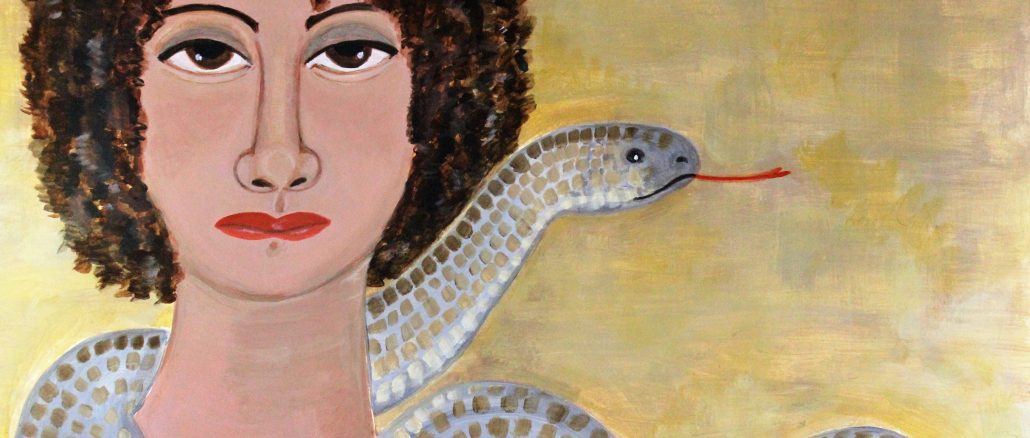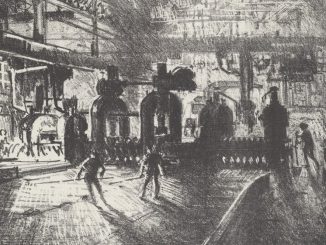
When people are marginalized, their doctors are, too. A woman remembers her childhood and the decisions she and her family made.
Grandmother didn’t like secrets. She said to me, “Secrets come from Satan.” I don’t know if she really believed this, or if she liked the power as she hissed it in my ear.
She was devastating to be around. I kept an eye on her hands—fidgeting or violent. She wanted my most intimate thoughts and secrets, she dug in with her words. Are you having sex? No, too young? Are you letting the boys at school look at your panties? Do other girls do that? No? You think you’re so smart. Better than me, huh? You’re not going to feel so smart when you are 15 and pregnant. All that education won’t mean anything when your husband beats you up. You’ll deserve it. Someone has to beat your opinions out of you.
In her youth, she had been beautiful. In a painting commissioned by one of her sons, she’s striking in a traditional embroidered top. Her hair is plaited into thick ropes looped and tied with green ribbons. Her stare is direct and emotionless.
In photos yellowed with age, she’s a squat overweight woman staring into the camera, unaware that she has degenerated. She’s tightly bound with girdles and corsets. Legs were encased in support hose. Her body was sausaged into polyester muumuus. On her ears, she wore traditional Mexican earrings shaped like birds with tails dangling into teardrops. The gold in her ears matched the gold partials in her mouth.
But if she was feeling mean, she took them out to make you hold her teeth.
In her practice as the local healer, she didn’t offer operations or invasive measures, but she was what the neighborhood of El Monte had available if they couldn’t go to American doctors. She had herbs and syringes. To those people, she was a relief. Poverty is an amazing stressor. While mainstream people can go to doctors or even a free clinic, marginalized people have to find alternative methods to cope. There’s scant money, and if families are also undocumented, this takes its toll in fear and anxiety. Most often, families use illegally prescribed drugs, expired drugs, or drugs other family members discarded or didn’t use. They also buy drugs at the Swap Meet.
Our diseases are different, too. American doctors don’t understand what it meant to suffer from bilis or susto or latido. These are constructs from a different country, from a different world, from a different time. So, the women came to my grandmother instead, hoping she might help them. They brought their vials to her. For a few dollars, she patched them up and pushed them onward.
Rosemary can be used for a number of things. It can help with stomach problems and for blood circulation. To reap the benefits, you boil the stems with leaves in water until the water turns an avocado green. You drink it. It tastes like bitter moss water. You need to drink lots of it for long periods of time for it to work. Because of the amounts you will have to consume, it’s best to have a plant—and a bathroom nearby. You can also boil rosemary and put it in your bath for muscle pain.
The herbs grew at the perimeter of the yard behind the chain link fencing that surrounded her house. My grandfather kept a chain wrapped around the double gate that closed with a spring lobster clasp. A non-working metal padlock hung on one end to make people think the gate was secure. The chain and lock didn’t impede anyone. Men could easily jump onto the chain link fence, plant a foot over the top while their arms supported their weight and leap over. But that metal padlock comforted my grandmother.
The two women stood outside the gate and banged the loose end of the chain against the gate. Metal clanged against metal. Loud and obnoxious.
“¡Doña! ¡Doña!” called the older woman.
They took a few steps back when the dogs charged the fence, rabid with excitement. Grandfather gripped his knees and heaved himself to his feet.
“¡Sáquense!” he said. He kicked the dogs away.
Grandmother inched the living room curtain to watch. She lowered the loud TV volume. Grandfather unlatched the chain.
“Pásense,” he said.
The women came into the yard. The one holding the baby gripped the child closer. The baby was wrapped in many blankets to prevent the air from hitting his face.
Had the women looked up, they would have seen Grandmother peering from the curtain. My grandmother glared at how closely Grandfather stood next to the women and how widely he smiled. She grumbled, ready to battle her claim over him.
“Animál,” she said to the empty room.
With her tongue, she adjusted the partials and bit them into place. She stood by the heavy iron door to greet the women.
“¿Qué quieren? ¿Qué tiene el niño?”
“Fíjese que no se siente bien. Llora mucho,” said the older woman.
“Vamos a ver que tiene.”
Grandfather got back on his knees to continue weeding, while my grandmother led the women inside; they took a seat. The mother peeled the blankets away from the baby. The baby emerged from the blankets dazed.
The women sat and began to explain the baby’s symptoms to her.
Those neighborhood women sought Grandmother for her medicinal wisdom. She could look at a child and tell whether it needed to be healed from a susto—a fear. She used corn oil or lard to cook, but kept a bottle of olive oil for customers. She rubbed the baby joints so deeply her thumbs squeezed through to the bone. Her squat, thick hands massaged the temples, holding the bridge of the tiny nose in one hand and the nape of the neck in the other, pulling up, as the baby wailed in pain. She cooed and worked and gave them oil to drink. Children left her home slick as seals after an oil spill and just as alert.
Tomatoes soaked in alcohol can be tied with rags to the feet of toddlers and young children to bring down a fever. However, the child will be extra unhappy at having to do this. The tomatoes do not feel good. They are squishy and cold. The tomatoes feel even worse when they have warmed up and their seeds have traveled. The child will look back and become angry every time they think about it.
Women came for their needs, too. They came shyly or insistently, handing my grandmother the tiny vials filled with clear fluids they smuggled from Mexico, clear as water but bitterly fragrant. My grandmother took the syringes from their place behind the locked vitrine. While the women waited, my grandmother boiled the needles and syringes in her kitchen till the glass turned opaque, then pulled them out with the tongs she used to flip tortillas. Needles were not easy to obtain. She reused the same needles, blunt with overuse. Their sharp points rounded, causing more pain as they pierced through the flesh and into the muscle.
She took those vials without understanding what was in them. Even in her late sixties, my grandmother was barely literate. She could write her name and read falteringly, but rarely remembered how to spell my name or any of her grandchildren’s. Her family did not think girls were worth educating. She’d carried that belief along with her when she’d migrated. She’d moved across into another country but she’d brought all of her beliefs with her, never conforming and never blunting her sharp edges.
When Grandmother was ready, the women followed her to the back room where they lay on her bed face down. The middle of her bed sagged where the springs had bent from my grandparents’ weight. The room was filled with perfumes and lotions. The mirror in her bedroom was dull from the loose Avon talc powder she applied every morning. The large containers were sealed with thin rice paper that barely contained the clouds of white that burst forth when she released the enormous pouf to powder her neck and breasts. On the corner of her dresser sat a wig from the sixties on a red velvet Styrofoam bed. On occasion, grandmother would hold the wig upright with her left hand while she brushed it like a cat.
In her bedroom, the women lay on their tummies, undid zippers, and pulled down the back of their pants to reveal pale orbs. They squirmed and shut their eyes, as Grandmother climbed into bed with them, her enormous weight tipped the bed as she climbed in after them. She breathed raggedly as she positioned herself above the woman. She felt the muscle, pressing, as if tenderizing the meat. She cleaned the woman’s flesh with a cotton ball soaked in alcohol. She dipped the vial, sucking the stuff into the syringe. She pushed the plunger till the liquid squirted and the needle was clear of air. With a quick flip of the wrist, she impaled their flesh, injecting the fluid into their muscle, then rubbing the injection site vigorously with her naked fingers.
The woman limped back. On leaving, she handed Grandmother a few crumpled dollars. Did she feel my grandmother’s hatred, heavy as the demons grandmother tried so hard to keep out of her home? She spoke poorly of these women who came to her with their bare buttocks and their naked need, their children wrapped tightly in blankets.
A red thread must be used during an eclipse to protect a pregnant woman. This is especially important if she refuses to wear the red underwear her grandmother is sure she gave her last Christmas. The thread protects the baby from the harmful effects of the eclipse, which can cause birth defects. While this may seem unlikely, red thread acts as a force field.
“She’s on birth control,” Grandmother said. “Who knows who she’s fucking? She’s not even married.”
“Look at her,” she said. “See how she twists her body when she walks? What a whore.”
They trusted her with their vials and their secrets and their children. Did they know she couldn’t read what was on those tiny bottles they handed her? Those medicines, smuggled dangerously across countries, were so precious. Could they read her vacant eyes blurred by a layer of cataracts? Those eyes, which were so eager to know their ailments and gaze at their naked vulnerability? She rolled her partials in her mouth with her tongue as she delighted in their misfortunes.
Saliva is of vital importance if you want beautiful skin. In particular, it helps with acne. To reap the benefits, however, you must use morning saliva. Spit into your fingers and spread it on your face. It may sound untoward, but don’t brush your teeth first. It will not work if your mouth is clean. Leave it on the face for about an hour then wash it off. Additionally, if you have warts, use the blade of a pair of scissors coated in saliva to make the wart go away. Open the scissors to its full capacity. Use the saliva and run the blade over the wart. This must be done every day. Do not lick the blades.
If the women wanted plants, Grandmother parceled plants out stingily. She gave one of the women quick instructions on how to cook and drink the herbs. All the while, she yanked the plants roughly, bending the stems till they snapped and their scent filled the air with their pungent acrid smells. Their fragrance covered her hands and their oils spread on her fingers, as she stuffed them into a reused plastic shopping bag.
For her family, she brought out the marijuana leaves steeped in cane alcohol. The marijuana leaves swam in the alcohol, having turned a pallid green. This concoction relieved muscle pain. The alcohol on its own was good for toothaches. Soaking a cotton ball and putting it in the pained tooth numbed the area for hours, until you could see a doctor or until you needed the next dose.
Doctors and dentists were a luxury. That meant paying for the bus and the appointment and the medicine. So, I sucked on that cotton ball in agony. Knowing that grandmother’s herbs were a staggering gift that I didn’t want but desperately needed.
If your ears have been plugged up for a long while, it’s time to use urine. This requires, of course, that you use someone else’s pee. It won’t work if you use your own. The urine must be warm and fresh from the bladder. Have the source fill a container. It is best to use a container that has a wide enough mouth to fit your ear into. Place the container over your ear and tip the other way. The urine should completely fill your ear and fix the problem. It’s important to use caution with this remedy. You must create a seal or the urine will run into your face and the cure will be spoiled. Also, do not kneel and have a parent urinate into your ear. This lacks dignity.
Along with her herbs, she kept gallons of holy water in old milk cartons. From time to time, then obsessively, she’d sprinkle the water around to keep the demons at bay and purify her home. She imaged that every room was haunted. Those rooms felt haunted with a heaviness a specter couldn’t possibly hold. But she went over the rooms over and over again, thinking she could fix it with water a priest had said words over.
Those women didn’t understand what my grandmother was taking from them. Exchanges with her were more than polite words and a few dollars; they felt thick like the liquids she warmed in her palm and injected into bodies.
Instead, the women became part of her imagination. They featured in her narratives as negligent mothers with too many boyfriends. They snuck around alleys and behind buildings to have sex and shoot drugs. In her mind, she twisted their bodies and dirtied their integrity. They were all as monstrous as she was.
When I was in 4th grade, Grandmother walked me down the corridor of her house and towards the back door. She reached into an old vitrine and pulled out a syringe.
“Quiero que practiques en una almohada.”
My eyes widened as she put the syringe in my palm. It was made of a thick, clouded glass. I tested the plunger to see how it felt. I imagined a human on the other end.
We walked to the front room, leading me into the dimly lighted living room.
“¿Quieres aprender o no?” she said to me.
“Sí. ¿Que hago?” I said.
We sat on the sofa in the living room underneath her portrait. She leaned into me so close that I could smell her perfume and dental cream. Huddled together, we looked like a family instead of a woman and child practicing to violate the law—hoping to violate bodies. She used a pillow to show me how to angle the needle and pierce the skin. She sent me home with the needle. My grandmother didn’t have many syringes. I knew this was a precious gift. I wondered as I walked home whether I could do what she did. She was acting as a comfort to those women. She was a violator and a liar, but they didn’t know that. Could I be like her?
I wanted her to love me. But I could feel how I was another person thrown into her destructive storyline of women. In her mind, she was already weaving me into her perception of women as whores. I didn’t want to be another red thread. Perhaps if she saw how special I was, she might love me more. In the environment of our home, I was already filling with frustration and sadness and that was evolving into self-hatred. Could I be like Grandmother?
I walked into the house and into my room. I opened my dresser drawer and nestled the syringe amongst my underwear. In the next couple of days, I visited the syringe, wondering who I wanted to be. Wondering if I could ignorantly pierce another human with substances I didn’t understand.
I took out the syringe and practiced on pillows over and over. I waited to see if my grandmother would give me more instructions, more lessons. She didn’t. But the sinister exchange stayed with me. Perhaps she’d been testing me. To see whether I was like her. To see if the rabid gleam of malice shone in my eye. To see if I was willing to make her some money or at least bring her some pride. But that wasn’t who I was. What I remember is using the syringe to spray water on the bean plants I kept in my bedroom. And the awe I felt as I watched them grow out of their bags and tumble onto the floor.

Make sure to read our exclusive interview with the author, “La Loca Del Kuuchamaa: Interview With Mireya Vela.”
 MIREYA S. VELA is a creative non-fiction writer and researcher in Los Angeles. In her work, Ms. Vela addresses the needs of immigrant Mexican families and the disparities they face every day. She tackles issues of inequity and how ingrained societal systems support the (ongoing) injustice that contributes to continuing poverty and abuse. Ms. Vela received her Bachelor’s degree in English from Whitter College and received her Master of Fine Arts from Antioch University in 2018. She is also a visual artist.
MIREYA S. VELA is a creative non-fiction writer and researcher in Los Angeles. In her work, Ms. Vela addresses the needs of immigrant Mexican families and the disparities they face every day. She tackles issues of inequity and how ingrained societal systems support the (ongoing) injustice that contributes to continuing poverty and abuse. Ms. Vela received her Bachelor’s degree in English from Whitter College and received her Master of Fine Arts from Antioch University in 2018. She is also a visual artist.
Follow her on Instagram and Twitter: @mireyasvela
Visual Art website: mireyavela.com
Featured image: Mireya S. Vela, “With Snake.”


